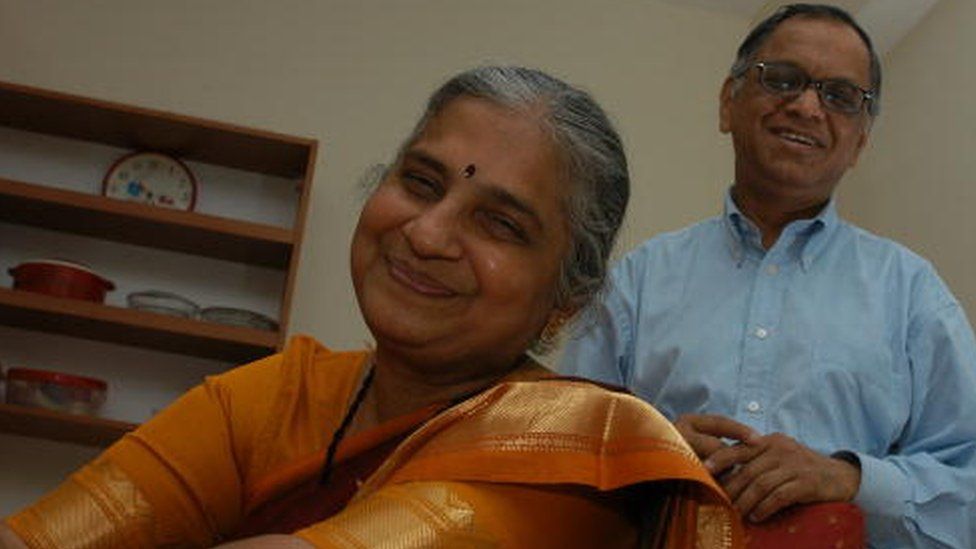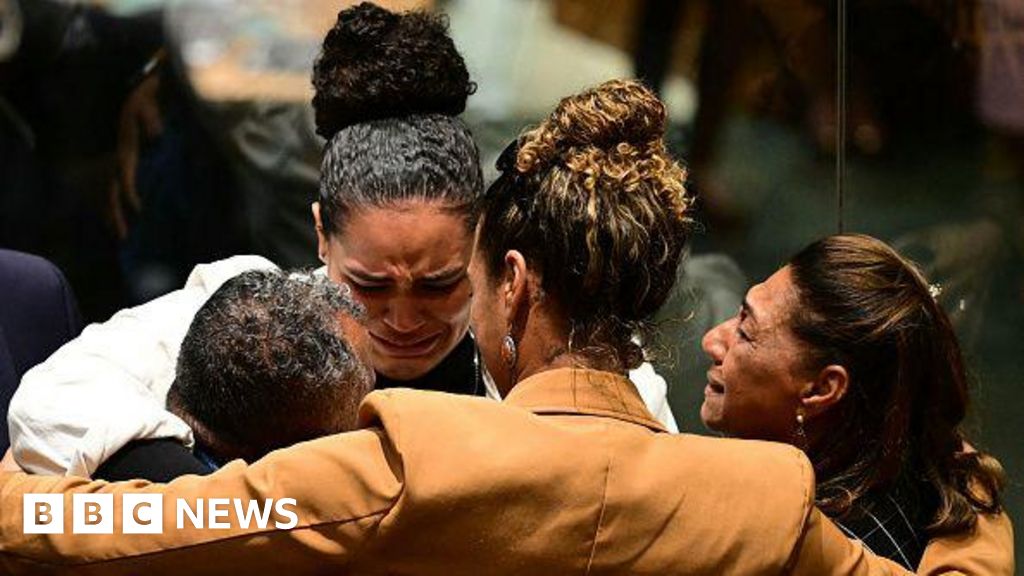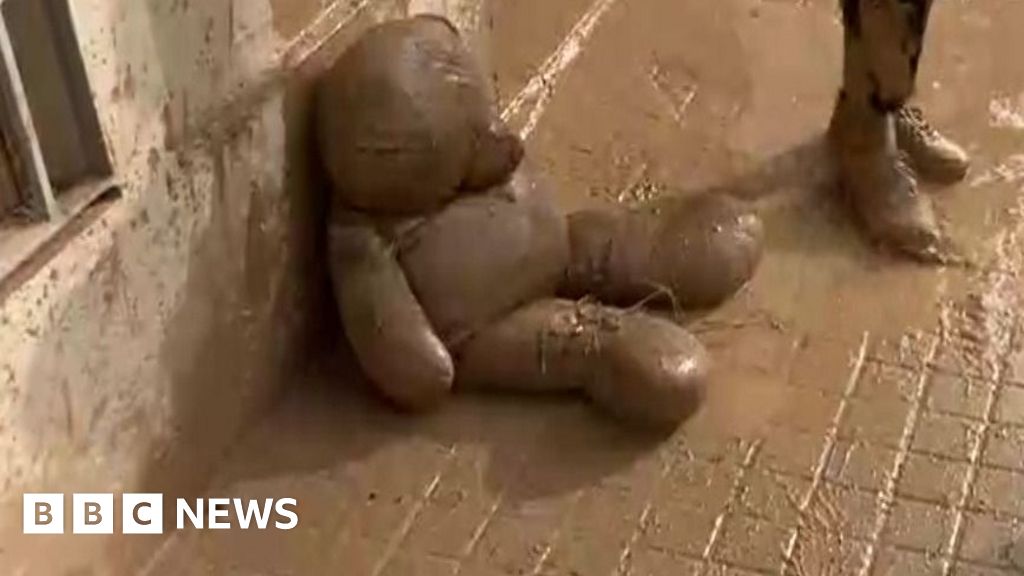ARTICLE AD BOX
 Image source, Getty Images
Image source, Getty Images
Sudha Murty with her husband Narayana Murthy
By Geeta Pandey
BBC News, Delhi
Food is used across the world to unite people. But in India, a comment from popular author, philanthropist and educator Sudha Murty on her food habits has set social media abuzz with a lively debate about vegetarianism.
The lives of Ms Murty and her husband - Indian software billionaire NR Narayana Murthy - have been under a lot more scrutiny ever since their son-in-law Rishi Sunak became the prime minister of Britain.
But the 72-year-old mother and grandmother's recent remark - made on a popular food show called "Khaane Mein Kya Hai?", which roughly translates to "What's for lunch/dinner?" - has seen her name trend on Twitter for three full days.
Describing herself as "a pure vegetarian" who doesn't even eat eggs, Ms Murty said that on her travels abroad, she often carried her own food and that "one of my biggest fears is that the same spoon may have been used for both vegetarian and non-vegetarian dishes".
"So when I travel, I look for a pure vegetarian restaurant. And I carry an entire bag full of food. I used to tease my grannies decades ago when they would carry their own food. I used to ask them why can't you eat the food that's available there? But now I behave like them," she added.
The video of her comment has gone viral on social media, with voices evenly divided between those criticising and defending her.
Her calling herself a "pure vegetarian" - a description that millions of Indians use to distinguish themselves from those who identify as vegetarians but eat egg - has riled many who say it's rooted in the notions of purity dictated by the caste system and shows her upper-caste Brahmanical sensibilities. Even though some historians say Brahmins in parts of India traditionally ate meat - and many still do - being a vegetarian has somehow come to be associated with purity.
Image source, Getty Images
Image caption,Sudha Murty's daughter Akshata is married to British Prime Minister Rishi Sunak
"Vegetarianism as practiced in India is imbricated in the caste order. As a personal choice, it has only one line of defence - it is a matter of habit, which is tough to break even while acknowledging its caste foundation," tweeted social scientist Janaki Srinivasan.
"Do vegetarians not understand the concept of soap? This level of paranoia and focus on 'purity' and 'contamination' is 100% a product of Brahminism," wrote another Twitter user.
Some shared photos of Ms Murty alongside those of Mr Sunak carrying plates of cooked meat.
The strong criticism has surprised many in India - where at least 20% people identify as vegetarians who consume only plant-based foods and dairy - with some confessing to doing the same.
"I will gladly have food next to a non-vegetarian. But I will be extremely uncomfortable if same spoons are used for veg & non-veg food. I will rather skip the meal. If you don't understand this, it's your problem. In support of #SudhaMurthy & everyone in their food choices," wrote senior police official Arun Bothra.
Journalist Sheela Bhatt said she knew many people who behaved exactly like Ms Murty and asked that she be left alone.
Some also pointed to the research that most Indians who eat meat follow some sort of dietary laws and traditions. For example, many meat-eating Hindus shun beef while Muslims avoid pork.
One Twitter user explained that it was not just vegetarians, but many Indian meat-eaters avoided "the French onion soup made from beef broth and thick-cut Belgian fries fried in beef tallow", while many Muslims turned vegetarian when they weren't sure whether the meat was halal.
Image source, Getty Images
Image caption,Being a vegetarian has come to be associated with being virtuous in India
The criticism and conflicting views are not surprising in a country where the ancient caste system, which divided Hindus into strict hierarchies and bestowed many privileges on the upper castes while sanctioning repression of the lower castes by privileged groups, still evokes strong emotion.
Even though discrimination on the basis of caste has been illegal for decades now, its stranglehold on society continues with those at the bottom of the system continuing to report discrimination and exclusion.
In the past decade, vegetarianism has also been increasingly weaponised in India, with Hindu vigilante groups attacking and lynching Muslims and Dalits for transporting or eating beef. (Hindus consider cow a holy animal.)
In that historical context, Ms Murty's critics say that someone of her stature and eminence should be more aware of what she says in public.
Ms Murty has not commented on the Twitter storm her comment has generated, and is unlikely to do so as this is not the first time her remarks has made headlines in recent months.
In May, she was trolled heavily on social media after she told a TV host that an immigration officer in London refused to believe her address was 10 Downing Street, the prime minister's residence, and asked her if she was "joking". She said she believed it was because of her "simple appearance".
A month prior to that, she had made headlines in India for saying in jest that "just as I made my husband a businessman", her daughter Akshata Murty had "made her husband [Mr Sunak] a prime minister".
Her boast, at least about herself, has never been questioned - it's well known that she had lent $250 to her husband in 1981 to start his IT company.
BBC News India is now on YouTube. Click here to subscribe and watch our documentaries, explainers and features.

 1 year ago
52
1 year ago
52








 English (US)
English (US)